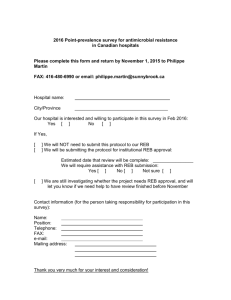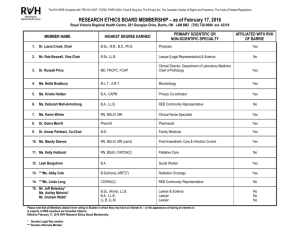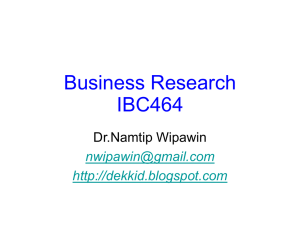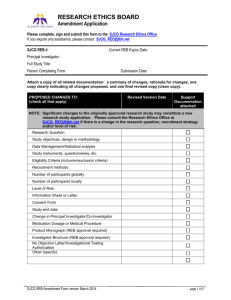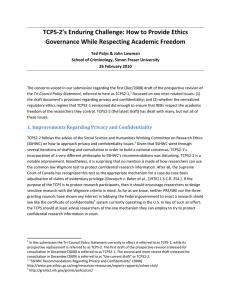What’s Been Did and What’s Been Hid: Reflections on TCPS2 Contents
advertisement
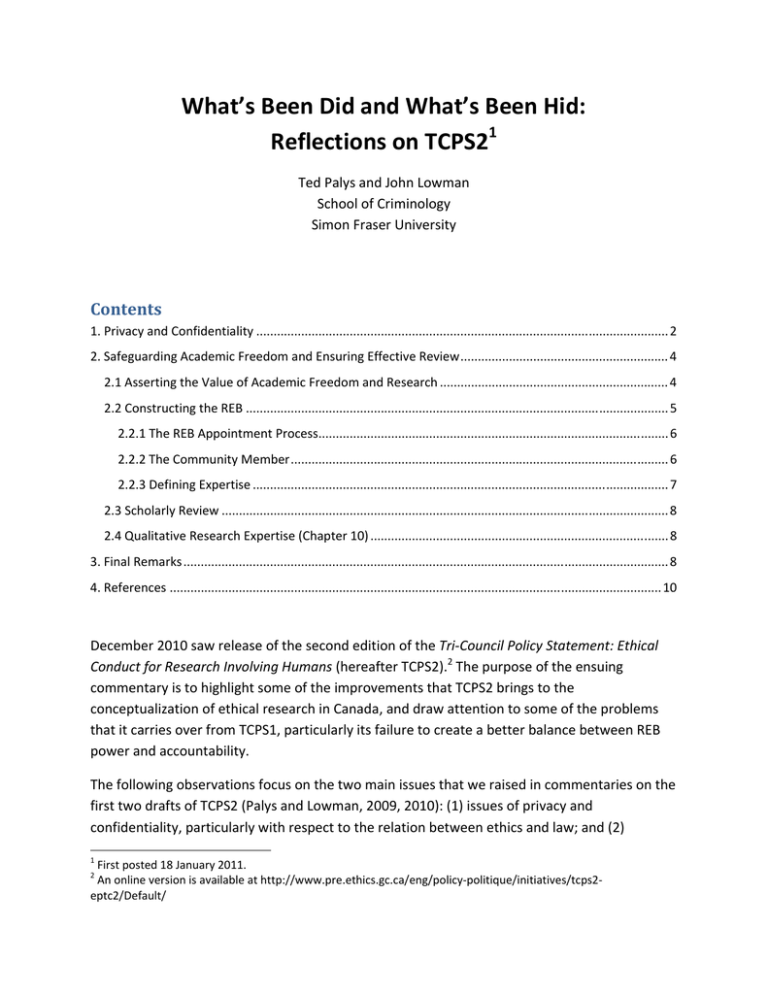
What’s Been Did and What’s Been Hid: Reflections on TCPS21 Ted Palys and John Lowman School of Criminology Simon Fraser University Contents 1. Privacy and Confidentiality ....................................................................................................................... 2 2. Safeguarding Academic Freedom and Ensuring Effective Review ............................................................ 4 2.1 Asserting the Value of Academic Freedom and Research .................................................................. 4 2.2 Constructing the REB .......................................................................................................................... 5 2.2.1 The REB Appointment Process..................................................................................................... 6 2.2.2 The Community Member ............................................................................................................. 6 2.2.3 Defining Expertise ........................................................................................................................ 7 2.3 Scholarly Review ................................................................................................................................. 8 2.4 Qualitative Research Expertise (Chapter 10) ...................................................................................... 8 3. Final Remarks ............................................................................................................................................ 8 4. References .............................................................................................................................................. 10 December 2010 saw release of the second edition of the Tri-Council Policy Statement: Ethical Conduct for Research Involving Humans (hereafter TCPS2).2 The purpose of the ensuing commentary is to highlight some of the improvements that TCPS2 brings to the conceptualization of ethical research in Canada, and draw attention to some of the problems that it carries over from TCPS1, particularly its failure to create a better balance between REB power and accountability. The following observations focus on the two main issues that we raised in commentaries on the first two drafts of TCPS2 (Palys and Lowman, 2009, 2010): (1) issues of privacy and confidentiality, particularly with respect to the relation between ethics and law; and (2) 1 First posted 18 January 2011. An online version is available at http://www.pre.ethics.gc.ca/eng/policy-politique/initiatives/tcps2eptc2/Default/ 2 2 whether the structures of ethics review that TCPS2 articulates provide adequate safeguards for academic freedom against those university administrations and REBs for whom the TCPS sometimes becomes an instrument of academic imperialism, liability management and institutional censorship. 1. Privacy and Confidentiality Sixteen years have now passed since Russel Ogden, a graduate student in the School of Criminology at Simon Fraser University (SFU), became the first – and, as far as we know, the only – researcher in Canada ever to be subpoenaed and ordered by a legal authority to divulge the identities of research participants who were promised confidentiality. SFU’s response to that unique pre-TCPS event – effectively abandoning the researcher and his research participants and then attempting to impose a “law of the land” policy that would make an ethical pledge of strict confidentiality impossible (Lowman and Palys, 2001) – was a national embarrassment. SFU eventually changed course by apologizing to the student and recognizing his ethical courage. The administration formally announced that it would extend to graduate students the legal indemnity guaranteed to faculty under its collective bargaining agreement in order to challenge any threats to research confidentiality that might arise. It also came to recognize that researchers who would feel ethically obliged to refuse to divulge confidential sources, even to a court, should be able to provide guarantees of “strict confidentiality” that do not subordinate ethics to law. While TCPS1 mentioned potential legal limits to confidentiality, it did not resolve the debate that Ogden’s experience had raised: is a guarantee of “strict confidentiality” permissible, or must confidentiality always be “limited by law”? In 2008, on the basis of several iterations of national consultation, the Social Sciences and Humanities Research Ethics Special Working Committee (SSHWC) made a series of recommendations about how TCPS2 should resolve these issues. The final version of TCPS2 adopts and enhances these proposals. By emphasizing the fundamental importance of confidentiality to research, it is a considerable improvement over TCPS1, which gave more emphasis to the rare circumstances in which confidentiality might be limited. TCPS2 recognizes that: 1. There is a “duty” of confidentiality. This is a very strong and legally relevant term that will make TCPS2 an important reference point should research confidentiality in Canada ever again be threatened by a third party. When researchers obtain information with a promise of confidentiality, they assume an ethical duty that is central to respect for participants and the integrity of the research project. Breaches of confidentiality may harm the participant, the trust relationship between the researcher and the participant, other individuals or groups, and/or the reputation of the 3 research community. Research that probes sensitive topics (e.g., illegal activities) generally depends on strong promises of confidentiality to establish trust with participants. (p.58) 2. Researchers should separate their responsibility to protect research participants from any obligation they have to other authorities who might be interested in identifiable information about those participants. A role conflict may arise when those who manage and have the power to give access to prospective participants impose reporting obligations on researchers, or where the researchers themselves have greater allegiance to their other institutional obligation than they do to their research participants. While TCPS1 dealt with this role conflict, TCPS2 places it squarely in the section on confidentiality by requiring researchers to ensure they do not allow themselves to become informants: Researchers shall avoid being put in a position of becoming informants for authorities or leaders of organizations. For example, when records of prisoners, employees, students or others are used for research purposes, the researcher shall not provide authorities with results that could identify individuals unless the prior written consent of the participants has been given. Researchers may, however, provide administrative bodies with aggregated data that cannot be linked to individuals for purposes such as policy-making or program evaluation. (p.59) 3. While a researcher should strive to comply with law and try to resolve any conflicts between ethics and law in a manner that satisfies the edicts of both, neither should be taken to be absolutely subservient to the other. The allegiance to ethics or law in the unlikely event that they conflict should be left to the researcher’s conscience. Researchers may face situations where they experience a tension between the requirements of the law and the guidance of the ethical principles in this Policy. In such situations, researchers should strive to comply with the law in the application of ethical principles. Researchers should consult with colleagues, the REB or any relevant professional body, and if necessary, seek independent legal advice to help resolve any conflicts between law and ethics, and guide an appropriate course of action. (p.12) Researchers shall maintain their promise of confidentiality to participants within the extent permitted by ethical principles and/or law. (p.58) 4. Institutions should support researchers who are put in a position of defending research confidentiality: Researchers shall safeguard information entrusted to them and not misuse or wrongfully disclose it. Institutions shall support their researchers in maintaining promises of confidentiality. (p.58) However, like TCPS1 and the first two drafts of TCPS2, the final version of TCPS2 does not identify the common law mechanism that can be used to defend confidential research information: the Wigmore test. Although Wigmore is not the only legal basis for defending 4 research confidentiality, it is the test the Supreme Court of Canada uses to adjudicate claims of privilege (Slavutych v. Baker et al., [1976] 1 S.C.R. 254). In general, researchers can anticipate these requirements when designing research ethics protocols (Palys and Lowman, 2000).3 2. Safeguarding Academic Freedom and Ensuring Effective Review The original TCPS created a bureaucratically-intensive regime of ethics review that had especially negative consequences for academic freedom within the social sciences and humanities, and particularly for more qualitative research traditions (SSHWC, 2004; van den Hoonard, 2001). The most common complaint from researchers concerned the inappropriate imposition of biomedical practices and solutions that may make sense in relation to biomedical/experimental research, but would be epistemologically inappropriate and sometimes unethical in a more qualitative field-based context (SSHWC, 2004).4 SSHWC’s analysis suggested there were many factors involved in producing the frustrations and injustices that were experienced, including deficiencies in the policy itself, epistemological imperialism on the part of some review boards, REB member conflicts of interest that were not properly recognized or managed, and REBs lacking the appropriate methodological expertise and/or experience needed to review proposals. TCPS2 contains several changes presumably implemented to address these problems, but left many other aspects of the review process untouched. We review these acts and omissions below. 2.1 Asserting the Value of Academic Freedom and Research TCPS2 begins by introducing the policy statement and the ethical issues it addresses with expanded and much appreciated statements that extol the social value of research and of academic freedom in its realization. For example: There can be no doubt that research has greatly enriched and improved our lives. Significant advances in human understanding in the social sciences, humanities, natural sciences, 3 Specific research situations where third party challenges are plausible and research participants could suffer serious harm would benefit from case-specific legal advice. 4 For example, some committees would require researchers to require participants to sign informed consent statements, a procedure that is considered appropriate and routine in the biomedical realm, but which is anathema to much field research because (a) it imposes a legalist tone to a relationship that is supposed to be built on rapport and mutual trust; (b) it creates a paper trail of participation that undermines the researcher’s ability to protect confidentiality; and (c) it is often interpreted by participants as a liability-management tool that is for the benefit of the researcher and/or university rather than for protection of the participant. As another example, while more positivist/experimental/clinical research makes the researcher the star of the show who establishes standardized procedures and questions that are administered to every research participant, many qualitative researchers who favour more collaborative and emergent designs were rejected when they were unable to produce a complete sample list or standardized set of questions before heading into the field. 5 engineering and health sciences have been made as a result of research involving humans. A fundamental premise of this Policy is that research can benefit human society. In order to maximize the benefits of research, researchers must have academic freedom. Academic freedom includes freedom of inquiry, the right to disseminate the results of that inquiry, freedom to challenge conventional thought, freedom to express one’s opinion about the institution, its administration or the system in which one works, and freedom from institutional censorship. (p.7) However, the statement of risk used to justify the need for ethics regulation is overgeneralized: Research is a step into the unknown. Because it seeks to understand something not yet revealed, research often entails risks to participants and others. These risks can be trivial or profound, physical or psychological, individual or social. History offers unfortunate examples where research participants have been needlessly, and at times profoundly, harmed by research, sometimes even dying as a result. Ethical principles and guidelines play an important role in advancing the pursuit of knowledge while protecting and respecting research participants in order to try to prevent such occurrences. (p.7) There are numerous documented examples of biomedical research where research participants have been “profoundly harmed by research” and “sometimes even [died] as a result,” but where are similar examples from the social sciences and humanities? Generic statements about the severe risks that sometimes accompany biomedical research may serve the granting councils’ desire to impose on researchers a one-size-fits-all research ethics policy, but does it serve social science and humanities research? In the very next paragraph, TCPS2 states that: Given the fundamental importance of research and of human participation in research, we must do all that we can as a society to ensure that research is conducted in an ethical manner so as to build public confidence and trust. (p.8) How do global statements about profoundly harmed research participants help to build public confidence and trust in the social sciences and humanities which did not cause those problems in the first place? 2.2 Constructing the REB TCPS1 described sensitive and effective ethics review as follows: For meaningful and effective application, the foregoing ethical principles must operate neither in the abstract, nor in isolation from one another. Ethical principles are sometimes criticized as being applied in formulaic ways. To avoid this, they should be applied in the context of the nature of the research and of the ethical norms and practices of the relevant research discipline. Good ethical reasoning requires thought, insight and sensitivity to context, which in turn helps to refine the roles and application of norms that govern relationships. (TCPS-1, p.i-9) How ironic, therefore, that the document would then proceed to articulate an ethics review structure that, for the social sciences and humanities at least, reduced the likelihood that 6 “meaningful and effective” ethics review could occur. Unfortunately, TCPS2 retains these same structures. 2.2.1 The REB Appointment Process TCPS2 contains some of the same inconsistencies that plagued TCPS1 with respect to the institutional structure that governs the appointment and review process. On the one hand, both TCPS1 and TCPS2 point out the need to avoid institutional conflicts of interest. On the other, they both outline procedures that allow the appearance of conflict. For example, the section on appointment of REB members appropriately ensures that senior members of the university administration are not allowed to serve on the REB (p.70). However, the section on appointments allows institutional authorities to appoint REB members. How can an REB be considered independent if the administration appoints its members? Presumably individual universities could institute a mechanism for electing REB members, but they do not have to. Other inconsistencies and ambiguities remain. For example, the policy allows for the creation of an office for the administration of research ethics, and for the university administration to staff that office. The structure may include a Director of Research Ethics (DORE), such as the one we have at SFU, but the VP-Research appoints that person. This would be less of a problem if the DORE’s role was purely administrative, but at SFU the DORE performs delegated minimal risk review and attends REB meetings. If the VP-Research cannot attend an REB meeting because of an institutional conflict, is it any more appropriate for the VP-Research’s appointee to attend? TCPS2 allows minimal risk projects (other than course-based student projects) to be delegated to an REB member, but if research ethics administration staff are allowed to serve as “nonvoting members” of the REB, can they also perform delegated review? If yes, can the review process be said to be truly independent? 2.2.2 The Community Member Like its predecessor, TCPS2 requires that each REB have at least one “community member” who is supposed to "reflect the perspective of the participant" (p.72). For a clinical trial the community member could easily perform the role of the "average citizen" in order to ascertain whether a non-academic can understand a proposed informed consent statement. However, we have yet to see a university appoint the sorts of people who represent the “community” that we, as criminologists, study – homeless persons, intravenous drug users, drug dealers, sex workers, prisoners – notwithstanding the insights they could offer REBs whose members usually have no experience of such communities. Instead, the typical community member appointed to a Canadian REB is a middle-to-upper class business person, retired academic or local politician who operates as much on the basis of media stereotype as any other REB member. 7 2.2.3 Defining Expertise Presumably the academics on the committee are the ones who will bring the “insight and sensitivity to context” and knowledge about “the ethical norms and practices of the relevant research discipline,” but it is open to debate whether a single REB can adequately represent the full range of epistemologies and research methods that are practiced in a given university. Qualitative researchers reported to SSHWC their dissatisfaction about the way that qualitative proposals were being handled by REBs whose members lacked qualitative research expertise. At SFU several conflicts have involved qualitative research in situations where no REB member had experience with the contexts in which criminologists work, or of the populations that comprise their participants. When asked to identify which member(s) of the REB had qualitative research expertise, sometimes the REB would ignore the request – the question having been deemed offensive rather than as a simple request for how the REB is meeting its constitutive requirements under TCPS1 – or has offered the names of persons who have no relevant expertise. Just because someone has done some interviews or asked some open-ended questions in a survey does not mean that they are a “qualitative methods expert.” Louis Menand (1996) once observed that protections for academic freedom are important not only because they protect faculty from the meddling of external interests, but also because they protect academics from each other: Academic freedom, as it is now structured, depends crucially on the autonomy and integrity of the disciplines. For it is the departments, and the disciplines to which they belong, that constitute the spaces in which rival scholarly and pedagogical positions are negotiated. Academic freedom not only protects sociology professors from the interference of trustees and public officials in the exercise of their jobs as teachers and scholars; it protects them from physics professors as well. It mandates that decisions about what counts as good work in sociology shall be made by sociologists. (p.17) By creating an independent ethics review process TCPS1 ensured that researchers were buffered from both corporate/private interests and the university administrations who partnered with them. However, in the process of creating a one-size-fits-all ethics review process, even though it allowed a university to create several REBs, it offered little by way of advice about when more than a single REB would be desirable. In a university like SFU that, under TCPS1, had a single REB, it was difficult to create a Board with sufficient expertise to evaluate the range of proposals it received. TCPS2 allows for much greater flexibility in the review process and for recruiting advisors in certain circumstances. However, as researchers at a university that has a single REB, decisions about criminological research are still being made in part by epidemiologists and biochemists. TCPS2 would have helped solve these kinds of problems by giving more guidance about when establishing multiple REBs would be desirable. 8 2.3 Scholarly Review In the event that research is deemed to create greater than a minimal risk, TCPS2 allows an REB to undertake scholarly/peer review on its own when it declares itself to have the appropriate expertise, or to establish an ad hoc review process (p.21). There is no provision for researcher input into these processes, which continues to allow an REB to declare by fiat that it has the appropriate expertise or to cherry pick ad hoc reviewers. Although SSHWC (2004) identified this problem, it has not been addressed; the Presidents of the granting councils appear to prefer the Pollyanna view that REB members are angelic folk who recognize conflicts of interest, are able to put all their own epistemological baggage aside when reviewing proposals, and are not prone to defensive posturing when researchers challenge their decisions. In our experience, and in the view of SSHWC, some REBs and REB members live up to those ideals and some do not; some will do a good job, others will not. There are not sufficient mechanisms for researchers to hold REBs accountable short of the appeal process, depending on what TCPS2 means by an REB “decision.” If a researcher can appeal only an overall “negative decision,” then there is no mechanism for disputing the various decisions that an REB may makes about a particular application short of its final decision to approve or reject an ethics application. 2.4 Qualitative Research Expertise (Chapter 10) The inclusion of a new chapter dealing with qualitative research and the inclusion of qualitative research principles throughout relevant sections of TCPS2 is one of its most welcome improvements. To the extent that Chapter 10 elaborates principles that differentiate qualitative from quantitative and/or experimental research designs – for example, it allows an emergent research design, and authorizes researchers to avoid the legalistic relationship implied by a signed consent form – it will force REBs to be more sensitive to the protocols of qualitative methods. To the extent that it adequately captures qualitative approaches, it may serve as an example of the sort of experience and expertise that is required on REBs that review qualitative research. However, if REB members use the chapter on qualitative methods as a “Coles Notes” course enabling them to claim that they have developed that expertise, we will all be in trouble. 3. Final Remarks We have chosen to focus our remarks on the issues that have been the focus of our previous commentaries – the policy statement’s provisions regarding privacy and confidentiality and the manner in which the policy statement’s regulatory framework includes adequate protections for academic freedom for researchers in the social sciences and humanities – even though there is so much in the new policy that might be discussed. In particular we have avoided 9 speaking about TCPS2’s position on matters that have no bearing on our research and for which we have no expertise, such as clinical trials and human genetics. It is noteworthy that the TCPS has grown from a 90-page document in 1998 to more than 200 pages in 2010. Will this significant expansion help create the “culture of ethics” to which the original authors of the TCPS aspired? Or will it further bureaucratize an already bureaucratically intensive process that, at its best, provides a light, selective, independent and thoughtful oversight -- but at its worst is a vehicle for epistemological imperialism, liability management and institutional censorship? No doubt it will provide some of both, and perhaps that is the TCPS’s enduring problem. The section that has been one of our primary foci over the years – the policy’s provisions regarding privacy and confidentiality – has improved to the point where it is respectful of different epistemological and moral perspectives, offers protections for research participants, and reminds both researchers and the institutions in which they work of their duties and obligations. To that extent, TCPS2 represents an exemplary policy that other nations can emulate. Some of its new features – the new qualitative chapter, for example – also hold potential to be a positive resource for qualitative researchers whose approaches and perspectives were conspicuously absent in TCPS1. The enduring challenge for the TCPS is to provide a model of ethics governance that fully respects academic freedom and reflects the presumption that, like any REB, its role is not to provide “right answers” but to ensure that the answers different researchers come up with do indeed have the interests of research participants at heart, and are consistent with the highest ethical standards of the TCPS and their respective disciplines. Unfortunately, TCPS2 goes no further than TCPS1 when it comes to providing mechanisms to hold REBs and institutional administrations accountable. One lingering question for the Presidents of the granting councils who remain the “stewards” of the TCPS is what mechanisms they will put in place for monitoring the impact of TCPS2 and ascertaining its strengths and weaknesses in a continuing process of policy evolution. All of the various committees, working groups and consortia who were charged with evaluating TCPS1 and formulating recommendations in their respective areas of expertise were dissolved at the point where the authors of what became TCPS2 stepped in. Although the structure of these committees could be improved, they played an important role as lightning rods for the identification of issues that needed to be addressed – from the perspectives of researchers, REBs, institutional administrations and (to a limited degree) research participants – and provided institutionalized vehicles through which programs of consultation and feedback could be instituted. We close by encouraging the Presidents of the granting agencies to institute a 10 process of on-going review with an eye to identifying the problems that will no doubt arise as TCPS2 is implemented, and TCPS3 starts to take shape. 4. References Menand, L. (1996). The limits of academic freedom. In L. Menand (Ed.) The Future of Academic Freedom. Chicago: University of Chicago Press, pp.3-20. Palys, T.S. and Lowman, J. (2000). “Ethical and Legal Strategies for Protecting Confidential Research Information.” Canadian Journal of Law and Society, 15(1), 39-80. Palys, T.S. and Lowman, J. (2009). “One step forward, two steps back: Draft TCPS-2’s assault on academic freedom.” http://www.sfu.ca/~palys/PalysLowmanCommentsOnDraftTCPS2.pdf. Palys, T.S. and Lowman, J. (2010). “TCPS-2’s enduring challenge: How to provide ethics governance while respecting academic freedom.” http://www.sfu.ca/~palys/PalysLowmanCommentsReTCPS2Draft2-final.pdf. Social Sciences and Humanities Research Ethics Special Working Committee (SSHWC) (2004). Giving Voice to the Spectrum: Report of the SSHWC to the Interagency Advisory Panel on Research Ethics. Online at http://www.sfu.ca/~palys/SSHWC-GivingVoice-2004.pdf Social Sciences and Humanities Research Ethics Special Working Committee (2008). “SSHWC Recommendations Regarding Privacy and Confidentiality.” Report prepared for the federal Interagency Advisory Panel on Research Ethics. http://www.pre.ethics.gc.ca/policypolitique/initiatives/docs/SSHWC_PC_Policy_Recommendations_-_January_2008__EN.pdf van den Hoonaard, W. (Ed.) (2001). Walking the Tightrope: Ethical Issues for Qualitative Researchers. Toronto: University of Toronto Press.
